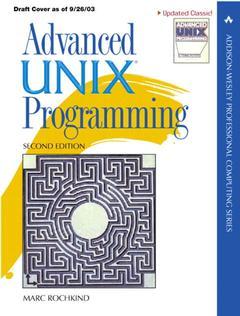Advanced UNIX Programming (2nd Ed.) Addison-Wesley Professional Computing Series
Auteur : Rochkind Marc

The changes to UNIX programming that have taken place since 1985 are extensive to say the least. The first edition of Advanced UNIX Programming is still used and considered to be a must have book on any UNIX programmer's shelf. With this new edition UNIX programmers now have a one-volume, comprehensive, in-depth guide to the essential system-level services provided to them by the UNIX family of operating systems - now including Linux, FreeBSD, and the Mac OS X kernel (Darwin). All UNIX application programs, regardless of what language they are written in, run on top of these services, so mastering them is essential for successful UNIX programming. And, with a movement towards open-source systems, programmers will appreciate the book's emphasis on portability.
Preface.
1 Fundamental Concepts.
2. Basic File I/O.
3. Advanced File I/O.
4. Terminal I/O.
5. Processes and Threads.
6. Basic Interprocess Communication.
7. Advanced Interprocess Communication.
8. Networking and Sockets.
9. Signals and Timers.
Appendix A. Process Attributes.
Appendix B. Ux: A C++ Wrapper for Standard UNIX Functions.
Appendix C. Jtux: A Java/Jython Interface to Standard UNIX Functions.
Appendix D. Alphabetical and Categorical Function Lists.
References.
Index.
MARC J. ROCHKIND was fortunate enough to have worked at Bell Laboratories in the 1970s, when UNIX was still in its infancy. It was there that Rochkind made several key contributions to UNIX, notably the Source Code Control System. He wrote the first edition of Advanced UNIX Programming in 1984. This complete revision benefits from his years of post-Bell application systems development experience.
- Covers the latest POSIX standards, and updated for Linux, FreeBSD, and Mac OS. X.
- Wide range of examples, including a Web browser, a Web server, and keystroke recorder/player, and a real shell.
- Marc Rochkind is regarded as one of the pioneers in UNIX programming and the first edition of this book is a true classic in UNIX programming.
Date de parution : 05-2004
Ouvrage de 736 p.
17.8x3.9 cm



